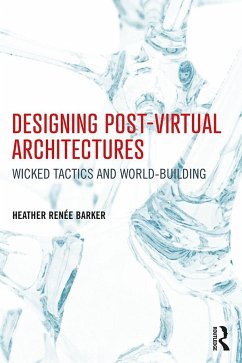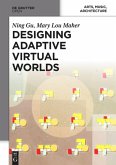- Gebundenes Buch
- Merkliste
- Auf die Merkliste
- Bewerten Bewerten
- Teilen
- Produkt teilen
- Produkterinnerung
- Produkterinnerung
With this book as a resource, architects and designers have a handbook of technical and philosophical concepts to lend rigor to their design work.
Andere Kunden interessierten sich auch für
![Architectures of Colonialism Architectures of Colonialism]() Architectures of Colonialism22,99 €
Architectures of Colonialism22,99 €![Designing Adaptive Virtual Worlds Designing Adaptive Virtual Worlds]() Ning GuDesigning Adaptive Virtual Worlds52,99 €
Ning GuDesigning Adaptive Virtual Worlds52,99 €![Architectures and their Impact on Environment Architectures and their Impact on Environment]() Kaveh Ostad-Ali-AskariArchitectures and their Impact on Environment37,99 €
Kaveh Ostad-Ali-AskariArchitectures and their Impact on Environment37,99 €![Architecture and the Virtual Architecture and the Virtual]() Marta JecuArchitecture and the Virtual133,99 €
Marta JecuArchitecture and the Virtual133,99 €![Designing the British Post-War Home Designing the British Post-War Home]() Fiona FisherDesigning the British Post-War Home209,99 €
Fiona FisherDesigning the British Post-War Home209,99 €![Architecture Post Mortem Architecture Post Mortem]() Architecture Post Mortem73,99 €
Architecture Post Mortem73,99 €![Resilient Post Disaster Recovery through Building Back Better Resilient Post Disaster Recovery through Building Back Better]() Sandeeka MannakkaraResilient Post Disaster Recovery through Building Back Better73,99 €
Sandeeka MannakkaraResilient Post Disaster Recovery through Building Back Better73,99 €-
-
-
With this book as a resource, architects and designers have a handbook of technical and philosophical concepts to lend rigor to their design work.
Hinweis: Dieser Artikel kann nur an eine deutsche Lieferadresse ausgeliefert werden.
Hinweis: Dieser Artikel kann nur an eine deutsche Lieferadresse ausgeliefert werden.
Produktdetails
- Produktdetails
- Verlag: Routledge
- Seitenzahl: 210
- Erscheinungstermin: 2. Dezember 2019
- Englisch
- Abmessung: 235mm x 157mm x 16mm
- Gewicht: 462g
- ISBN-13: 9781138639966
- ISBN-10: 1138639966
- Artikelnr.: 58381942
- Herstellerkennzeichnung
- Libri GmbH
- Europaallee 1
- 36244 Bad Hersfeld
- gpsr@libri.de
- Verlag: Routledge
- Seitenzahl: 210
- Erscheinungstermin: 2. Dezember 2019
- Englisch
- Abmessung: 235mm x 157mm x 16mm
- Gewicht: 462g
- ISBN-13: 9781138639966
- ISBN-10: 1138639966
- Artikelnr.: 58381942
- Herstellerkennzeichnung
- Libri GmbH
- Europaallee 1
- 36244 Bad Hersfeld
- gpsr@libri.de
Heather Renée Barker, Associate Professor of Design at California State University Long Beach, USA develops her work through the integration of research and practice. She is founding coordinator of the graduate Human Experience Design Interactions (MA_HXDI) program and the Immersive Design Research Lab and has served the city of Long Beach, California as Design Lead for the Bloomberg Philanthropies' funded Innovation Team (i-team) and as Design Strategy Lead for the Office of Civic Innovation.
Introduction - "How exactly, do I design?"
Pillar 01 - Discover / Epoché
Terminology (lexis) of human-centered design practice.
Introduction
Language is Code and Language is Strategy.
DISCOVER
Behavioral Science / Biology / Physics
Experience / Perception / Science Fiction / Space
Define
Artificial Intelligence / Learning Theory
Complexity Theory / Game Theory
Film Theory / Linguistics / Semiotics
Develop
Anthropology / Sociology
Mathematics / Philosophy / Poetry
Deliver
Architecture / Computer Science
Design / Design Thinking / Strategy
Pillar 02 - Define / Phenomenological Reduction
Methodologies that define design practice.
Introduction
Building Methodologies:
Experience Design / Process Constructive (XD/PC) Theoretical Framework
Pragma-Phenome Theory Statement
Pillars of the Applied Experience Design / Process Constructive Theoretical
Framework
Design Assets, Value Creation and Evaluation Criteria
Semantic Consistency and Alignment between Theory and Strategy
Development of the Methodologies
Applying the XD/PC Methodologies
Methodologies under the Pragma-Phenome Umbrella
Choose your own methodology
Consistent across all methodologies: Building the Data Space
Gamification as a Pragmatic Measure of Engagement
From Philosophy to Project
Engage In A World-Building Design Methodology
World-Building Methodology For Big, General, Undefined Issues
Engage In A Soft Systems Design Methodology
Emphasis On Systems.
Engage In An Imagist Design Methodology
Emphasis On Value.
Engage In A Pragmatist Design Methodology
Emphasis On Objects & Action.
Four Phases of the Pragma-Phenome Design Process Methodologies.
Self-Similar Phases of the Pragma-Phenome Design Process Methodologies.
Phase 01 Discover & Analyze - Epoché
Phase 02 Define & Contextualize - Phenomenological Reduction
Phase 03 Develop & Implement - Eidetic Variation
Phase 04 Deliver & Measure - Intersubjective Corroboration
Summary of Methodologies
Systemized Processes of Design Praxis
Pillar 03 - Develop / Eidetic Variation
Abstracted Principles, Generalized, and Prototyped in Practice
Case-Studies
Introduction
Methodologies as Applied to Case-Studies
World-Building Methodology (Space for Everyone Virgin Orbit)
Soft Systems Design Methodology (Urban Public Safety)
Imagist Methodology (Mobility: MC2 / 2028 Olympics / Toyota)
Pillar 01 - Discover / Epoché
Terminology (lexis) of human-centered design practice.
Introduction
Language is Code and Language is Strategy.
DISCOVER
Behavioral Science / Biology / Physics
Experience / Perception / Science Fiction / Space
Define
Artificial Intelligence / Learning Theory
Complexity Theory / Game Theory
Film Theory / Linguistics / Semiotics
Develop
Anthropology / Sociology
Mathematics / Philosophy / Poetry
Deliver
Architecture / Computer Science
Design / Design Thinking / Strategy
Pillar 02 - Define / Phenomenological Reduction
Methodologies that define design practice.
Introduction
Building Methodologies:
Experience Design / Process Constructive (XD/PC) Theoretical Framework
Pragma-Phenome Theory Statement
Pillars of the Applied Experience Design / Process Constructive Theoretical
Framework
Design Assets, Value Creation and Evaluation Criteria
Semantic Consistency and Alignment between Theory and Strategy
Development of the Methodologies
Applying the XD/PC Methodologies
Methodologies under the Pragma-Phenome Umbrella
Choose your own methodology
Consistent across all methodologies: Building the Data Space
Gamification as a Pragmatic Measure of Engagement
From Philosophy to Project
Engage In A World-Building Design Methodology
World-Building Methodology For Big, General, Undefined Issues
Engage In A Soft Systems Design Methodology
Emphasis On Systems.
Engage In An Imagist Design Methodology
Emphasis On Value.
Engage In A Pragmatist Design Methodology
Emphasis On Objects & Action.
Four Phases of the Pragma-Phenome Design Process Methodologies.
Self-Similar Phases of the Pragma-Phenome Design Process Methodologies.
Phase 01 Discover & Analyze - Epoché
Phase 02 Define & Contextualize - Phenomenological Reduction
Phase 03 Develop & Implement - Eidetic Variation
Phase 04 Deliver & Measure - Intersubjective Corroboration
Summary of Methodologies
Systemized Processes of Design Praxis
Pillar 03 - Develop / Eidetic Variation
Abstracted Principles, Generalized, and Prototyped in Practice
Case-Studies
Introduction
Methodologies as Applied to Case-Studies
World-Building Methodology (Space for Everyone Virgin Orbit)
Soft Systems Design Methodology (Urban Public Safety)
Imagist Methodology (Mobility: MC2 / 2028 Olympics / Toyota)
Introduction - "How exactly, do I design?"
Pillar 01 - Discover / Epoché
Terminology (lexis) of human-centered design practice.
Introduction
Language is Code and Language is Strategy.
DISCOVER
Behavioral Science / Biology / Physics
Experience / Perception / Science Fiction / Space
Define
Artificial Intelligence / Learning Theory
Complexity Theory / Game Theory
Film Theory / Linguistics / Semiotics
Develop
Anthropology / Sociology
Mathematics / Philosophy / Poetry
Deliver
Architecture / Computer Science
Design / Design Thinking / Strategy
Pillar 02 - Define / Phenomenological Reduction
Methodologies that define design practice.
Introduction
Building Methodologies:
Experience Design / Process Constructive (XD/PC) Theoretical Framework
Pragma-Phenome Theory Statement
Pillars of the Applied Experience Design / Process Constructive Theoretical
Framework
Design Assets, Value Creation and Evaluation Criteria
Semantic Consistency and Alignment between Theory and Strategy
Development of the Methodologies
Applying the XD/PC Methodologies
Methodologies under the Pragma-Phenome Umbrella
Choose your own methodology
Consistent across all methodologies: Building the Data Space
Gamification as a Pragmatic Measure of Engagement
From Philosophy to Project
Engage In A World-Building Design Methodology
World-Building Methodology For Big, General, Undefined Issues
Engage In A Soft Systems Design Methodology
Emphasis On Systems.
Engage In An Imagist Design Methodology
Emphasis On Value.
Engage In A Pragmatist Design Methodology
Emphasis On Objects & Action.
Four Phases of the Pragma-Phenome Design Process Methodologies.
Self-Similar Phases of the Pragma-Phenome Design Process Methodologies.
Phase 01 Discover & Analyze - Epoché
Phase 02 Define & Contextualize - Phenomenological Reduction
Phase 03 Develop & Implement - Eidetic Variation
Phase 04 Deliver & Measure - Intersubjective Corroboration
Summary of Methodologies
Systemized Processes of Design Praxis
Pillar 03 - Develop / Eidetic Variation
Abstracted Principles, Generalized, and Prototyped in Practice
Case-Studies
Introduction
Methodologies as Applied to Case-Studies
World-Building Methodology (Space for Everyone Virgin Orbit)
Soft Systems Design Methodology (Urban Public Safety)
Imagist Methodology (Mobility: MC2 / 2028 Olympics / Toyota)
Pillar 01 - Discover / Epoché
Terminology (lexis) of human-centered design practice.
Introduction
Language is Code and Language is Strategy.
DISCOVER
Behavioral Science / Biology / Physics
Experience / Perception / Science Fiction / Space
Define
Artificial Intelligence / Learning Theory
Complexity Theory / Game Theory
Film Theory / Linguistics / Semiotics
Develop
Anthropology / Sociology
Mathematics / Philosophy / Poetry
Deliver
Architecture / Computer Science
Design / Design Thinking / Strategy
Pillar 02 - Define / Phenomenological Reduction
Methodologies that define design practice.
Introduction
Building Methodologies:
Experience Design / Process Constructive (XD/PC) Theoretical Framework
Pragma-Phenome Theory Statement
Pillars of the Applied Experience Design / Process Constructive Theoretical
Framework
Design Assets, Value Creation and Evaluation Criteria
Semantic Consistency and Alignment between Theory and Strategy
Development of the Methodologies
Applying the XD/PC Methodologies
Methodologies under the Pragma-Phenome Umbrella
Choose your own methodology
Consistent across all methodologies: Building the Data Space
Gamification as a Pragmatic Measure of Engagement
From Philosophy to Project
Engage In A World-Building Design Methodology
World-Building Methodology For Big, General, Undefined Issues
Engage In A Soft Systems Design Methodology
Emphasis On Systems.
Engage In An Imagist Design Methodology
Emphasis On Value.
Engage In A Pragmatist Design Methodology
Emphasis On Objects & Action.
Four Phases of the Pragma-Phenome Design Process Methodologies.
Self-Similar Phases of the Pragma-Phenome Design Process Methodologies.
Phase 01 Discover & Analyze - Epoché
Phase 02 Define & Contextualize - Phenomenological Reduction
Phase 03 Develop & Implement - Eidetic Variation
Phase 04 Deliver & Measure - Intersubjective Corroboration
Summary of Methodologies
Systemized Processes of Design Praxis
Pillar 03 - Develop / Eidetic Variation
Abstracted Principles, Generalized, and Prototyped in Practice
Case-Studies
Introduction
Methodologies as Applied to Case-Studies
World-Building Methodology (Space for Everyone Virgin Orbit)
Soft Systems Design Methodology (Urban Public Safety)
Imagist Methodology (Mobility: MC2 / 2028 Olympics / Toyota)








